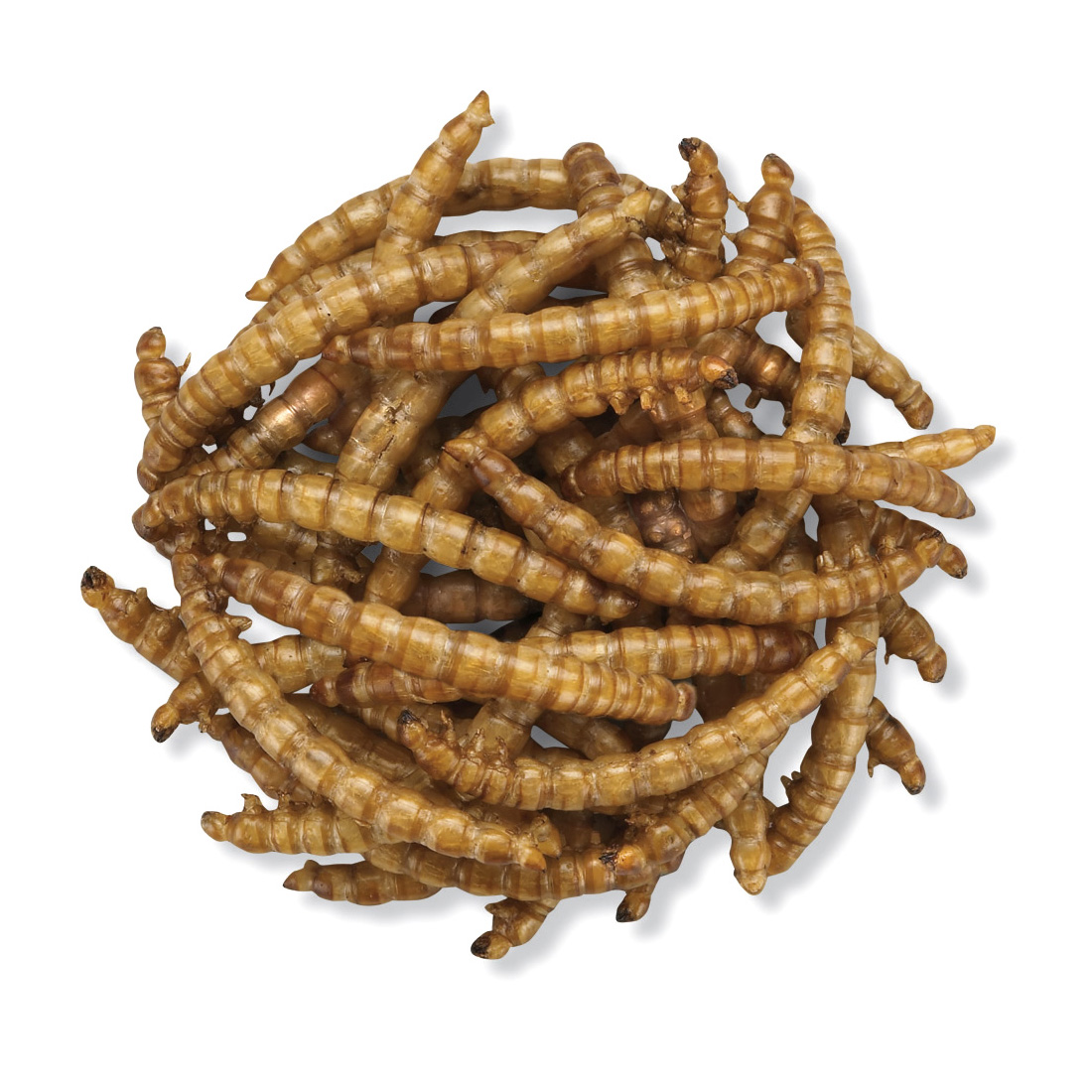
Bluebirds find DPAT dry mealworms for bluebirds irresistible. These tiny treats pack a punch of essential nutrients, making them a perfect addition to their diet. Mealworms mimic the insects bluebirds naturally hunt, offering a familiar and satisfying food source. They’re also incredibly easy to serve, whether sprinkled on the ground or placed in feeders. During colder months, when insects are scarce, dry mealworms provide a reliable source of protein and energy. Pairing them with other natural foods like berries or seeds ensures bluebirds get a balanced diet while delighting birdwatchers with their vibrant presence.
Key Takeaways
- Dry mealworms are a nutrient-rich food source that provides bluebirds with essential protein, fats, vitamins, and minerals for energy and health.
- Offering dry mealworms mimics the natural diet of bluebirds, encouraging their instinctive foraging behaviors and making feeding more enjoyable for them.
- These mealworms are easy to store and serve, with a long shelf life that allows birdwatchers to feed bluebirds consistently throughout the year.
- Pairing dry mealworms with other natural foods like berries or seeds creates a balanced diet that supports bluebird vitality and well-being.
- Feeding bluebirds dry mealworms during winter months ensures they receive the necessary nutrition when insects are scarce, helping them maintain strength and warmth.
- Using a bluebird-specific feeder can help attract these birds while keeping larger birds away, ensuring bluebirds get their share of the mealworms.
- DPAT Mealworms are a top choice for bird enthusiasts due to their high quality, convenience, and nutritional benefits, making it easy to support bluebirds in your backyard.
Nutritional Benefits of Dry Mealworms For Bluebirds
Bluebirds thrive on a diet rich in nutrients, and dry mealworms offer an excellent source of essential nourishment. These tiny treats provide the building blocks for energy, growth, and overall health, making them a favorite among bluebirds.
High Protein Content for Energy and Growth
Protein plays a vital role in a bluebird’s diet. It fuels their daily activities, supports muscle development, and aids in the growth of young birds. Dry mealworms for bluebirds are packed with protein, making them an ideal food source. During breeding seasons, when bluebirds need extra energy to care for their chicks, this protein boost becomes even more critical. By offering dry mealworms, bird enthusiasts can help bluebirds stay active and healthy throughout the year.
Essential Fats for Feather Health and Insulation
Fats are another key component of dry mealworms. These fats contribute to the health of a bluebird’s feathers, ensuring they remain vibrant and strong. Healthy feathers not only enhance a bird’s appearance but also provide insulation during colder months. This is especially important in winter when bluebirds rely on their plumage to stay warm. Including dry mealworms in their diet helps maintain this natural protection, keeping them comfortable in harsh conditions.
Vitamins and Minerals That Boost Bluebird Well-being
Dry mealworms also contain a variety of vitamins and minerals that support bluebird health. Calcium, for instance, strengthens bones and aids in egg production for female bluebirds. Fiber promotes digestion, while other nutrients contribute to overall vitality. Pairing dry mealworms with other natural foods like berries or insects can create a balanced diet. This combination ensures bluebirds receive the hydration, energy, and nutrients they need to thrive.
"Insects like mealworms are a natural part of many birds’ diets, appealing to their instincts and providing essential nutrition." – Wild Bird Store
By incorporating dry mealworms into their feeding routine, birdwatchers can support bluebirds’ well-being while enjoying their lively presence in the backyard.
How Dry Mealworms Mimic Bluebirds’ Natural Diet
Dry mealworms closely resemble the insects bluebirds naturally eat. These small, protein-packed treats align with the bluebird’s instinctive diet, making them an excellent choice for backyard feeding. By offering dry mealworms, bird enthusiasts can provide a food source that feels familiar and satisfying to these vibrant birds.
Similar to the Insects Bluebirds Eat in the Wild
In the wild, bluebirds feast on a variety of insects, including beetles, caterpillars, and grasshoppers. Dry mealworms replicate the texture and nutritional value of these natural prey items. Their high protein content mirrors what bluebirds rely on for energy and growth. This similarity makes dry mealworms an irresistible option for bluebirds, especially during nesting and fledgling periods when their dietary needs increase.
"Bluebirds are naturally drawn to insects like mealworms, which provide essential protein and mimic their instinctive feeding habits." – Birdwatching Digest
Adding dry mealworms to feeders or scattering them on the ground creates a natural feeding experience for bluebirds. This approach not only attracts them but also supports their health by offering a diet they recognize and enjoy.
Encourages Natural Foraging Behaviors
Feeding dry mealworms encourages bluebirds to engage in their natural foraging behaviors. In their habitat, bluebirds actively search for insects on the ground or in low vegetation. Offering dry mealworms in a feeder or on open surfaces allows them to mimic this instinctive behavior. This keeps them mentally stimulated and physically active.
For an even more enriching experience, pairing dry mealworms with other natural foods like berries or seeds can create a diverse feeding environment. This combination ensures bluebirds receive a balanced diet while maintaining their natural instincts.
A Reliable Food Source During Scarce Seasons
During colder months, insects become scarce, leaving bluebirds with fewer options for nutrition. Dry mealworms provide a reliable food source during these challenging times. Their long shelf life and easy storage make them a convenient choice for birdwatchers who want to support bluebirds year-round.
Bluebirds especially benefit from dry mealworms in winter when they need extra energy to stay warm. These nutrient-rich treats help them maintain their strength and vitality, even in harsh conditions. By offering dry mealworms consistently, bird enthusiasts can ensure bluebirds have the sustenance they need to thrive, regardless of the season.
The Convenience of Using Dry Mealworms For Bluebirds
Dry mealworms offer unmatched convenience for birdwatchers and bluebird enthusiasts. Their ease of use and practicality make them a favorite choice for feeding bluebirds in any backyard.
Long Shelf Life and Easy Storage
Dry mealworms stand out because of their long shelf life. Unlike live insects, they require no refrigeration and can be stored for months without spoiling. Keeping them in a cool, dry place ensures they remain fresh and ready to use. This makes them an excellent option for birdwatchers who want to stock up and feed bluebirds consistently throughout the year.
For those looking to extend storage even further, dry mealworms can be rehydrated by soaking them in warm water for about 20 minutes before serving. This process not only makes them more appealing to bluebirds but also adds moisture, which is especially beneficial during dry seasons.
"Dried mealworms are a freeze-dried version of mealworm beetle larvae, offering a convenient and nutritious alternative to live insects." – Bird Feeding Guide
Simple to Serve in Feeders or on the Ground
Serving dry mealworms couldn’t be easier. They can be placed in a dedicated feeder, mixed with seeds, or simply sprinkled on the ground. Bluebirds naturally forage for food at low levels, so scattering mealworms on open surfaces mimics their instinctive feeding habits. This approach encourages bluebirds to visit regularly and keeps them active.
For added variety, pairing dry mealworms with other natural foods like berries or suet creates a balanced diet. This combination ensures bluebirds receive essential nutrients while enjoying a diverse feeding experience.
A Clean and Mess-free Feeding Option
Dry mealworms provide a clean and hassle-free feeding solution. Unlike live insects, they don’t wriggle or escape, making them easy to handle. They leave no residue or unpleasant odors, keeping feeders and feeding areas tidy. This makes them an ideal choice for birdwatchers who want to enjoy the beauty of bluebirds without the mess.
Additionally, dry mealworms can be offered in small quantities to avoid waste. If any leftovers remain, they can be easily collected and stored for future use. This practicality ensures that feeding bluebirds remains an enjoyable and stress-free activity.
By incorporating dry mealworms into their feeding routine, bird enthusiasts can create a welcoming environment for bluebirds. These tiny treats are not only convenient but also provide the nourishment bluebirds need to thrive.
Why Choose DPAT Mealworms for Bluebirds
Bluebirds deserve the best, and DPAT Mealworms deliver just that. These dry mealworms stand out as a top choice for bird enthusiasts who want to provide a nutritious, convenient, and high-quality food source. Let’s explore why DPAT Mealworms are the perfect option for bluebirds.
Nutritional Profile of DPAT Mealworms
DPAT Mealworms offer a balanced blend of nutrients that promote the health and vitality of bluebirds. Packed with protein, fat, and fiber, these mealworms provide everything bluebirds need to thrive. Protein supports energy and muscle development, while fat contributes to feather health and insulation. Fiber aids digestion, ensuring bluebirds stay active and healthy.
Unlike live mealworms, DPAT Mealworms retain all the essential nutrients without the hassle of handling live insects. This makes them an excellent choice for birdwatchers who want to support bluebirds’ well-being in a simple and effective way.
"Dried mealworms retain all the protein and fat of live mealworms but are easier to store and more affordable." – DPAT Mealworms
Pairing DPAT Mealworms with other natural foods like berries or seeds can create a balanced diet for bluebirds. This combination ensures they receive hydration, energy, and essential nutrients, keeping them vibrant and strong.
Easy Storage and Care Instructions
Storing DPAT Mealworms is incredibly simple. These dry mealworms have a long shelf life and require no refrigeration, making them a practical option for bird enthusiasts. Keeping them in a cool, dry place ensures they remain fresh and ready to use whenever needed.
For those who want to enhance the feeding experience, rehydrating the mealworms is easy. Soaking them in warm water for about 20 minutes adds moisture, making them even more appealing to bluebirds. This is especially helpful during dry seasons when hydration becomes crucial for birds.
"Proper storage and transportation are essential to maintain the quality of dried mealworms." – DPAT Mealworms
The straightforward care instructions make DPAT Mealworms a hassle-free choice for anyone looking to attract and nourish bluebirds in their backyard.
Reliable Quality and Availability
DPAT Mealworms are known for their consistent quality and availability. Whether you’re purchasing a small batch or stocking up for the season, you can count on DPAT to deliver reliable products. Their commitment to quality ensures that every mealworm meets the nutritional needs of bluebirds.
The affordability of DPAT Mealworms also makes them a great option for birdwatchers who want to feed bluebirds regularly without breaking the bank. With DPAT, you get a product that combines value, convenience, and nutrition.
By choosing DPAT Mealworms, bird enthusiasts can enjoy the satisfaction of supporting bluebirds with a dependable and nutritious food source. These mealworms make it easy to create a welcoming environment for bluebirds, ensuring they return to your backyard time and time again.
Dry mealworms are a fantastic way to attract bluebirds while supporting their health and natural behaviors. These nutrient-packed treats provide energy, promote feather health, and mimic the insects bluebirds love in the wild. Pairing dry mealworms with natural foods like berries or seeds creates a balanced diet that keeps bluebirds thriving. Watching these vibrant birds enjoy their mealworms is a rewarding experience for any birdwatcher. Try offering DPAT Mealworms in your backyard and enjoy the lively activity and beauty bluebirds bring to your outdoor space.
FAQ
How do you feed mealworms to bluebirds?
Bluebirds enjoy both live and dried mealworms. To feed them, place mealworms in a feeder designed for bluebirds or scatter them on the ground where they naturally forage. Mixing mealworms with other foods like seeds or fruits can create a balanced diet. For live mealworms, ensure they come from a reliable supplier to maintain the right blend of protein, fat, calcium, and fiber.
Tip: Rehydrating dried mealworms by soaking them in warm water for about 20 minutes can make them more appealing to bluebirds.
Can mealworms attract bluebirds to my yard?
Mealworms can help attract bluebirds, but success depends on whether bluebirds already frequent your area. If bluebirds are nearby, offering mealworms can encourage them to visit regularly. However, if bluebirds are uncommon in your yard, other birds may consume the mealworms first. To increase your chances, pair mealworms with other natural foods like berries or suet and provide a welcoming habitat with nesting boxes.
What type of feeder works best for dried mealworms?
A bluebird-specific feeder is ideal for serving dried mealworms. Feeders with small openings or enclosed designs help keep larger birds like starlings away. For recommendations, consider Erva’s Bluebird Mealworm Feeder, which many birdwatchers find effective. Placing the feeder in an open area also makes it easier for bluebirds to spot.
How can I keep other birds from eating the mealworms?
To deter other small birds, use a feeder designed specifically for bluebirds. Feeders with adjustable perches or enclosed spaces can limit access to unwanted visitors. Positioning the feeder away from areas where other birds gather may also help. Additionally, offering mealworms in small quantities ensures bluebirds get their share before others consume them.
Do bluebirds prefer dried mealworms over other insects?
Bluebirds typically prefer dried mealworms over alternatives like dried black soldier fly larvae. Rehydrating dried mealworms can make them even more enticing. While bluebirds enjoy a variety of insects, mealworms closely mimic their natural diet, making them a favorite choice.
Can dried mealworms be paired with other foods?
Yes, pairing dried mealworms with natural foods enhances a bluebird’s diet. Combine them with berries, seeds, or suet to provide a variety of nutrients. This combination ensures bluebirds receive hydration, energy, and essential vitamins. Offering diverse food options also keeps their feeding experience engaging and satisfying.
Are dried mealworms suitable for winter feeding?
Dried mealworms are an excellent choice for winter feeding. During colder months, insects become scarce, and bluebirds need extra energy to stay warm. Mealworms provide a reliable source of protein and fat, helping bluebirds maintain their strength. Rehydrating the mealworms adds moisture, which is especially beneficial during dry winter conditions.
How should dried mealworms be stored?
Store dried mealworms in a cool, dry place to maintain freshness. They have a long shelf life and don’t require refrigeration. For extended storage, keep them in an airtight container. If you plan to rehydrate them, soak only the amount needed for immediate feeding to avoid waste.
Why aren’t bluebirds eating the mealworms I put out?
Bluebirds may not eat mealworms if they’re unfamiliar with the food or if other birds consume them first. To encourage bluebirds, place the mealworms in a bluebird-specific feeder and position it in a quiet, open area. Rehydrating dried mealworms can also make them more appealing. Patience is key, as it may take time for bluebirds to discover and trust the food source.
Are DPAT Mealworms a good choice for bluebirds?
Absolutely! DPAT Mealworms offer a balanced nutritional profile with high protein, fat, and fiber content. Their long shelf life and easy storage make them convenient for birdwatchers. Rehydrating DPAT Mealworms enhances their appeal, ensuring bluebirds receive a nutritious and satisfying meal. Pairing them with other natural foods creates a well-rounded diet that supports bluebird health year-round.


